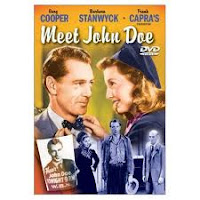As we head into the holiday season, our favorite time of year, we get the opportunity to re-watch, and make all those around us watch or re-watch, some of our favorite films. This would include It's a Wonderful Life, with Jimmy Stewart and Christmas in Connecticut with Barbara Stanwyk. If you combine the director of the former (Frank Capra) with the star of the latter (Ms. Stanywck) you end up with Meet John Doe.
Wikipedia:
Meet John Doe is a 1941 comedy drama film directed and produced by Frank Capra and starring Gary Cooper and Barbara Stanwyck. The film, about a "grassroots" political campaign, created unwittingly by a newspaper columnist and pursued by a wealthy businessman, became a box office hit and was nominated for an Academy Award for best original story (for Richard Connell and Robert Presnell Sr.)It's a great film that plays both light and deep and with wonderful performances by its leads. It's also a holiday film, if marginally so, but with a powerful speech about redemption and the role of Christ in dying so we don't have to. But it's a religious film at all. It's a film about populism, about the press, about businessmen, about earning a paycheck, and about manipulators in benefactor's clothing, seeking to control all.
Not so much different from this long piece in New York Magazine about the Koch brothers. David and Charles have spent portions of their vast fortune trying to destabilize President Obama. They are libertarians and pursue a philosophy that fits quite nicely with their business interests. They want lower taxes, fewer environmental restrictions and regulations, and the general dismemberment of a Federal structure. It's amazing that they have managed to actually match (and mask) these goals to a group of people willing to blindly smoke their gas pipe.
The anti-government fervor infusing the 2010 elections represents a political triumph for the Kochs. By giving money to “educate,” fund, and organize Tea Party protesters, they have helped turn their private agenda into a mass movement. Bruce Bartlett, a conservative economist and a historian, who once worked at the National Center for Policy Analysis, a Dallas-based think tank that the Kochs fund, said, “The problem with the whole libertarian movement is that it’s been all chiefs and no Indians. There haven’t been any actual people, like voters, who give a crap about it. So the problem for the Kochs has been trying to create a movement.” With the emergence of the Tea Party, he said, “everyone suddenly sees that for the first time there are Indians out there—people who can provide real ideological power.” The Kochs, he said, are “trying to shape and control and channel the populist uprising into their own policies.”(N.Y. Magazine)
One might think we have an anti-capitalist bent, or harbor some resentment against billionaires, but you would think wrong. While we find George Soros, the AntiKoch, mildly disturbing with his one world utopian chatter, he has at least worked to bring down totalitarian governments (as opposed to accidentally propping them up per Koch history). People like Gates and Buffet have contributed to American greatness in the public and private sectors. In the back of our heads we wish were James Simons, who from New York City and Long Island overseas Renaissance Technologies, an investment group that has richly rewarded its individual and institutional investors over the years (some, ahem, more than others).
But much of what the Koch brothers stand for is at odds with what might be good for the United States. The fact that they veil their patronage under euphemistic names does not help matters. We hardly imagine that those "foot soldiers" out there raising hell at town halls and rabidly emailing and calling freshman GOP members are fully cognizant of the extent to which they have not merely been co-opted, but outright seduced into ideas not of their own creation.
You can ask a child if they want an apple or a pear, by way of not asking if they want any of the other 50 items in the household. The child will see the presented choice as the universal set. He will never say I want it all, necessarily. It's a mind game, where you limit the choices between what you want someone to have, and what you want someone to have even more.
Many of the ideas propounded in the 1980 campaign presaged the Tea Party movement. Ed Clark told The Nation that libertarians were getting ready to stage “a very big tea party,” because people were “sick to death” of taxes. The Libertarian Party platform called for the abolition of the F.B.I. and the C.I.A., as well as of federal regulatory agencies, such as the Securities and Exchange Commission and the Department of Energy. The Party wanted to end Social Security, minimum-wage laws, gun control, and all personal and corporate income taxes; it proposed the legalization of prostitution, recreational drugs, and suicide. Government should be reduced to only one function: the protection of individual rights. William F. Buckley, Jr., a more traditional conservative, called the movement “Anarcho-Totalitarianism.”(N.Y. Mag)
This world that the Koch family mafia wants is not nearly what we need to have, or what people will imagine they are getting once they have got it. This is not a benign or pure libertarian stance, since the Kochs and those of that ilk would effectively superimpose their own corporate interests atop the population. They want a type of freedom from any constraints, as though governments have not evolved as they have due to past applications of unchecked power in the private sector.
At the end of Meet John Doe D.B. Norton is shown to be the manipulator and fascist that he is. Gary Cooper very nearly commits suicide in the process of trying to keep discourse pure. It's a remarkable contrast of those getting played, and those playing, and we can only hope our fellow citizens wake up in time.


No comments:
Post a Comment